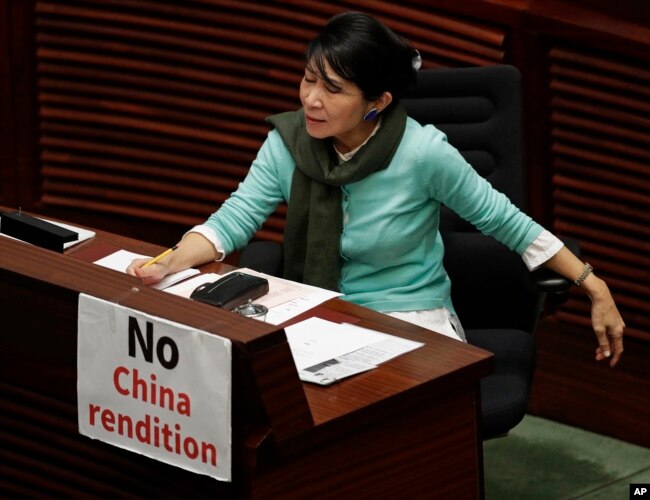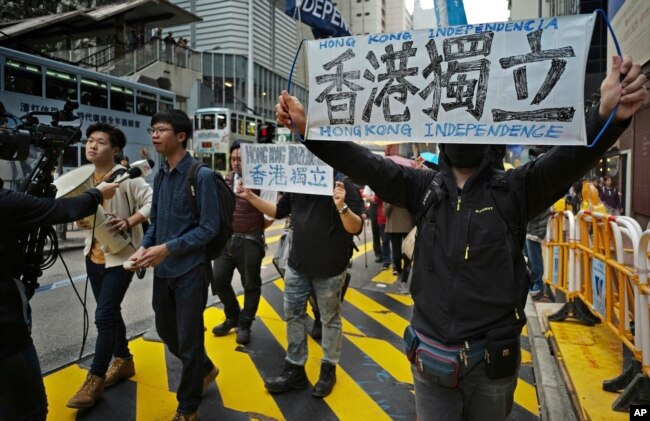Hong Kong took its first steps this week toward allowing extraditions to China, prompting warnings from across the political, legal and economic sectors that it could have significant legal and economic repercussions for the autonomous Chinese city, VOA news reports.
A bill introduced before the semi-democratic Legislative Council this week will allow Hong Kong to extradite to countries, including China, on a case by case basis.
The bill is opposed by the city’s democratic lawmakers who say Beijing could use any number of “crimes” to extradite activists, journalists and other political troublemakers despite assurances from Secretary for Justice John Lee.
“The fundamental bit is we have no trust and no confidence in the judicial and legal system on the mainland and if they want to play ugly, dirty whatever they can name anyone – you or me– for any packaged any coated – politically coated – crime and extradite you back to the mainland,” said democratic legislator Claudia Mo.
Hong Kong vs China
Hong Kong, a former British colony, has one of the most respected legal systems in Asia while China is regularly criticized by rights groups and Western governments for its poor legal track record.
Lee recently told reporters that Hong Kong would not extradite for crimes linked to “political opinion, religion, nationality or ethnicity.” Crimes must also be punishable by at least three years in prison for them to be considered for extradition, he said.
Beijing, however, often uses charges like tax evasion and other economic crimes to prosecute human rights lawyers and activists.
It has also not shied away from prosecuting foreigners on politically motivated charges. Canadians Michael Spavor and Michael Kovrig, detained in December, are currently facing spying charges in what is widely seen as retaliation for the arrest of Huawei executive Meng Wanzhou in Vancouver.
International reputation
Hong Kong is the Asia headquarters for dozens of multinational firms as well as media outlets, but its international reputation could be damaged if the extradition agreement proceeds, according to groups like the American Chamber of Commerce, the Hong Kong Bar Association and the Hong Kong Journalists Association.
Hong Kong’s Security Bureau removed nine economic crimes from an original list of 46 extraditable offenses following negative feedback from the business community. But even these changes have failed to assuage fears.
“It seems to me the concerns reflect the anxiety about the actual criminal justice system in the mainland and how adequate this is to protect people who have fallen afoul of it,” said Philip Dykes, chairman of the Council of the Hong Kong Bar Association.
“We’ve had many complaints of prosecutions that are sometimes influenced by political motives, that the judiciary is not independent, that defense lawyers are hard to get by, et cetera. If those are the concerns [for economic crimes] then logically they should be concerns for other offenses too.”
De Facto law
The Bar Association has also questioned whether the bill’s “case by case” approach to extradition would become the de facto law between Hong Kong and China, sidestepping input from the legislature that would be required in a long-term agreement.
While Hong Kong returned to Chinese sovereignty in 1997, it “deliberately” did not sign a long-term agreement with Beijing at the time because of the “fundamentally different criminal justice system operating in the mainland,” according to the Bar Association.
Changes to Hong Kong’s extradition laws, however, were motivated by a dramatic murder case last year when a Hong Kong man allegedly killed his pregnant girlfriend while on holiday in Taiwan.
Taiwan, an island democracy that Beijing considers to be a renegade province, also does not share an extradition agreement with Hong Kong, prompting the government to take action as it was unable to prosecute him for murder.


